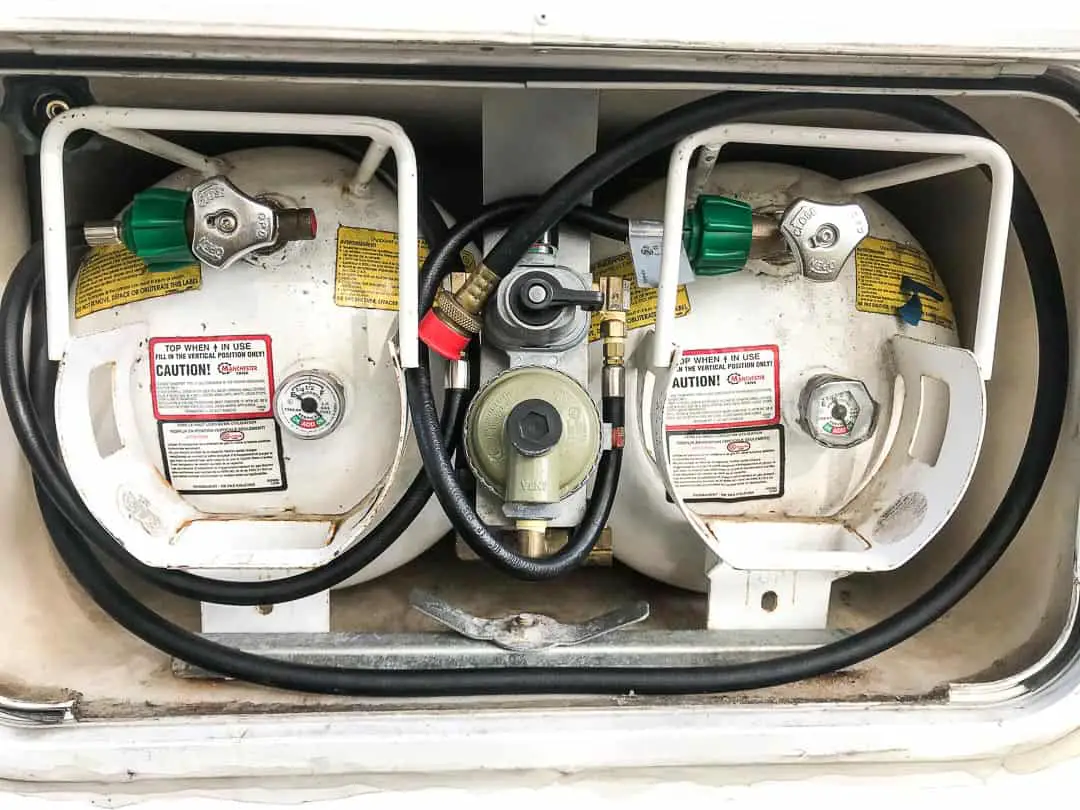Last Updated on February 26, 2022 by Chris and Lindsay
Understanding how to use RV propane is a simple but incredibly important concept. Every year there is a news story or two about an RV accident involving a propane leak. Fortunately, these are few and far between considering the hundreds of thousands of RVs on the road each year.
Still, we want to take the time to familiarize yourself with your RV propane system so you understand both the safety and the functions of each of your propane appliances.
Affiliate Disclaimer: We have included a handful of links to products we highly recommend when it comes to RV propane safety. If you choose to purchase these products through the links we will receive a small commission. But whether you purchase through our links or not, we want you to be safe in your RV.
How To Use Propane In An RV
Liquified Petroleum, or “LP,” is a gas commonly used in RVs and consists of propane, butane or a combination of the two. LP gas (“LPG”) will make your life on the road incredibly convenient.
From powering your refrigerator for weeks on end to providing hot water and heat on a cold night, propane is an essential part of truck camper camping, especially if you plan to dry camp or boondock frequently.
Here are the essential things you should know about how to use propane in an RV with propane appliances and how to practice RV propane safety during your travels.
RV Propane Safety
We put safety first in everything that we do. After all, what is the point in traveling if you can’t be healthy and well enough to enjoy what you can possibly see and do?
So when it comes to RV propane safety in your truck camper you want to be sure to spend the time and money on the tools and knowledge that will equip you to be safe.
LPG Alarm
The first thing you want to do is to test your current LPG alarm, assuming one is already installed in your camper. These are typically located near the floor of the camper since LPG is heavier than air and sinks.
An obvious sign of default will be if the light on the alarm is off. The light should be lit (typically green).
If there is a red light or no light at all this is your first sign that the alarm does not work.
If the light is green there may or may not be a button you can press to test the alarm. It will be loud and annoying. But that is exactly what you want to hear if you are asleep and have an LP gas leak.
A third way to test the alarm would be to spray an aerosol spray can in the vicinity of the alarm. This should trigger the alarm almost immediately.
If your alarm does not function the first thing you should do is to unscrew it from the wall and check the electrical connections. Because these are imperative to RV propane safety they are hard-wired into the camper/house battery. This is pretty standard in RV electrical system setups.
There is a chance that one of the wires has become disconnected and you can fix it by simply reconnecting the wires.
If the wires are connected and the LPG alarm still does not function then check the battery to ensure it holds a charge. Even a “dead” battery should have enough charge to power this alarm, however. So chances are if the wires are connected and the LPG alarm is still not working then the alarm itself is probably defective.
You should make it a top priority to replace this immediately. Turn off your LP gas tanks and do not use any propane appliances without replacing and testing the new LPG alarm. We consider this one of the RV essentials for safety.
This is our recommendation for an LPG alarm. It hardwires to the battery, draws little power but has a screeching loud 85 dB alarm.
Portable Gas Leak Detector “Sniffer”
A propane “sniffer” is another great RV propane safety tool. While not necessary for normal operations, if you happen to have an LPG alarm that continuously trips there is a good chance it is not the alarm that is defective.
Instead, you can expect that you have a leak somewhere in your RV propane system.
While you can try to find a propane service center or RV repair center to troubleshoot the propane leak, chances are you can locate the leak yourself. Truck campers in particular are small, so there are limited places where leaks could occur.
Using this leak detector you can scan areas near joints where the propane lines connect to each other and the various appliances.
NOTE: We cannot advise you to repair the propane leak yourself. You may want to consult a professional, particularly if you cannot determine where the leak is coming from.
We had this issue when we first moved into our truck camper. Our alarm was not functional. Upon further inspection, we found that it was disconnected from the battery. When we reconnected the alarm it immediately began to blare. Unsure if the alarm was defective we purchased a new alarm and installed it to the same end.
At this point, we used our portable gas leak detector to trace the propane lines from our propane tank. After some difficulty, we finally located a faulty valve in our heater that failed to close and was slowly leaking propane into our camper.
We had this fixed and found that our alarm only went off when we tested it with an aerosol spray.
You can get by with a simple gas leak detector like this one. It detects common gases such as propane, butane and methane and acts like a wand. The only draw is you have to reach your arm into tight spaces with this wand.
Or you can invest in a propane leak detector with a few more bells and whistles like this one. It detects the same gases but has a little longer probe that can stretch and bend to search hard-to-reach places.
These propane leak detectors are small enough to store and affordable enough that there is really no excuse not to keep one in your RV tool kit.
Propane Regulator
Your RV propane regulator is where propane released from the LPG tank is then distributed to your propane appliances. As such it is essential that you verify that there are no leaks and that it functions properly.
All connections to the propane regulator should be taped with the yellow thread sealant tape. This ensures that there is a solid connection between the fittings to ensure no gas leaks. If you do not see indications of this tape, you may want to consider unscrewing the fittings, taping them with new tape and screwing them back together.
Using your propane leak detector you will know right away if the fittings are secure before the LPG makes its way to the appliances.
If you are purchasing a used RV it is in your best interest to consider replacing the existing regulator if it looks as though it has seen better days. While the expression “if it ain’t broke, don’t fix it” seems to apply, this is a crucial fixture in your RV as it controls every propane appliance and is the core of your RV propane system.
If not replacing it, consider carrying a spare in the event the regulator does malfunction while you are camping.
We had dual tanks in our truck camper and we equipped the propane system with a dual tank 2-stage regulator. Not only does it control the flow of propane into your RV through the standard 2-stage regulation, but also it transfers from an empty tank to the full tank automatically.
This regulator is great for use in a dual-tank RV propane system. It automatically switches between tanks when you run out of LPG.
All propane fittings should be taped with this yellow tape to ensure that the threads of the fittings connect snugly together with no leaks.
RV Propane Appliances
Most truck campers (and general RVs for that matter) have the same basic appliances that operate on LP gas. This is what makes propane such an important part of your truck camper living experience.
While we’re giving you a brief overview of each appliance below, be sure to consult the owner’s manual for each appliance in your truck camper as different brands and models vary by manufacturer.
Here are the propane-fueled appliances most commonly found in truck campers.
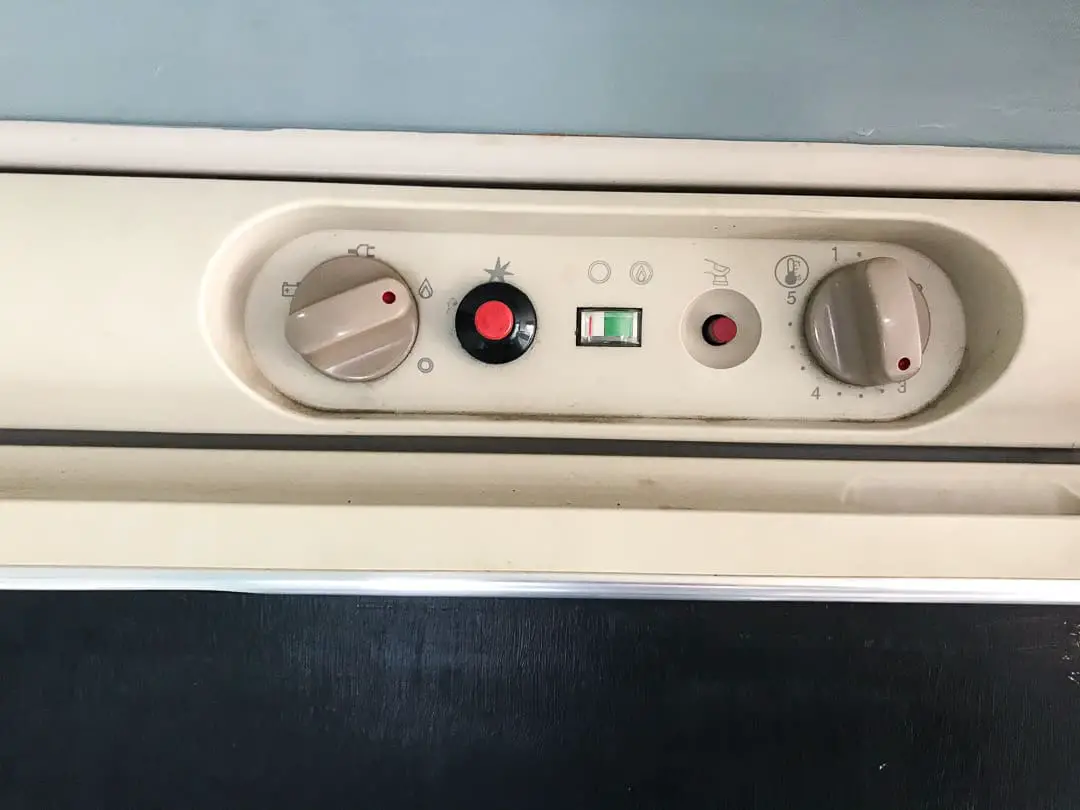
Refrigerator
There is a good chance that your truck camper is equipped with a refrigerator that is either 2-way or 3-way. If it is 2-way it will run on 110v electric and propane. If it is 3-way it will run on 110v electric, 12v battery and propane.
There are a variety of refrigerators that operate similarly on propane. First, be sure the propane tank is open. Next, you will need to ignite the propane in the back of the refrigerator. This is usually done with either a simple button or a combination starter button.
Typically you can hear the propane ignite behind the refrigerator and you will have some sort of indicator that the flame is lit. Your refrigerator may have a thermostat of sorts where you can adjust the temperature.
If you only run your refrigerator on propane you could likely run it for several weeks, if not months, depending on your LPG tank size.
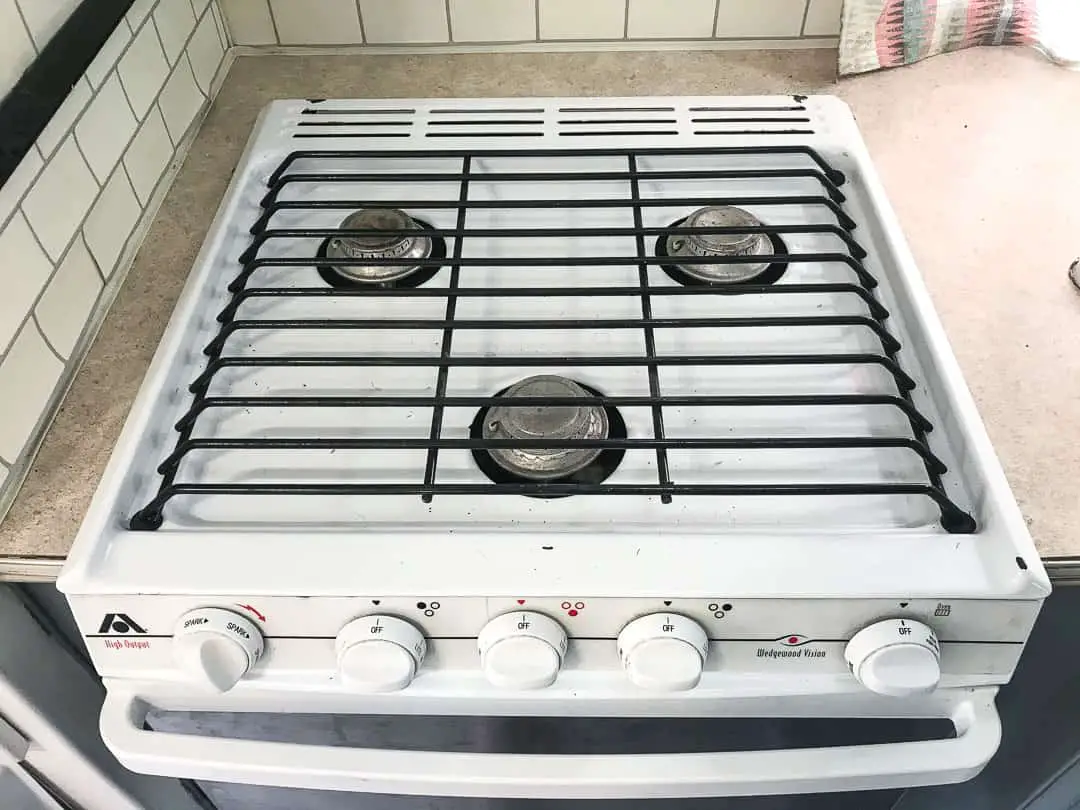
Stove/Burner
Most truck campers are equipped with a 3-stove propane burner. Unlike the refrigerator, the only way the stove operates is on LPG.
First, be sure that the LPG tank is open. Next, you will want to turn the knob for whichever burner you would like to light. You should hear the propane released through the burner as a light hiss. Immediately light the propane using either a knob ignitor or manually with a lighter.
Note, if you want to use more than one burner at once you should only light one burner at a time.
Also note you will want to ensure proper ventilation in your truck camper by opening a window or door and/or turning on a roof vent fan. And be sure that you have a carbon monoxide (CO) alarm that works.
Unlike LPG alarms, these are usually located at higher points in the camper because CO is slightly lighter than air and will rise in your camper.
We recommend a CO alarm like this one which must be hardwired to the battery. This ensures that it is always on and you do not have to worry about remembering to replace the batteries.
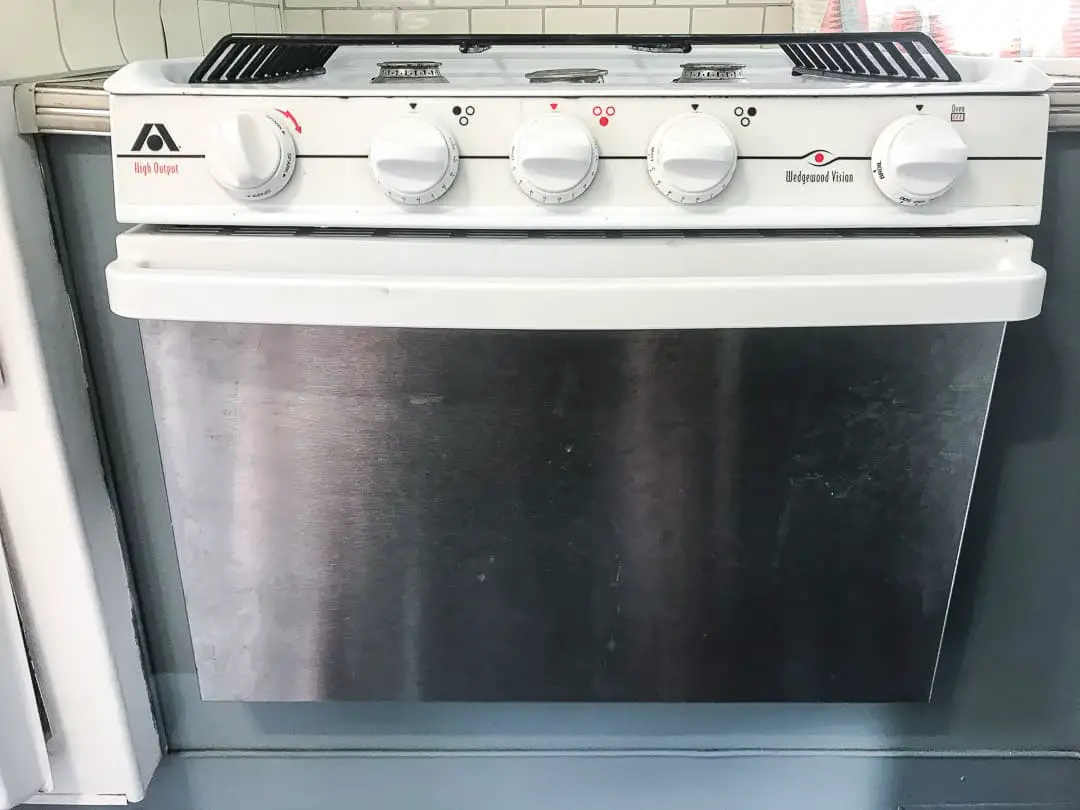
Oven
Your truck camper stove also probably doubles as an oven as well. Some of these ovens have their own self-igniting pilot light that you can light with the turn of a knob or press of a button.
But most will require you to turn on the gas and manually light the pilot light in the lower rear of the oven. Using a longer lighter is best.
But if you are unable to light the oven within two or three seconds be sure to stop, turn off the propane to the oven and let the oven vent before attempting to light it again.
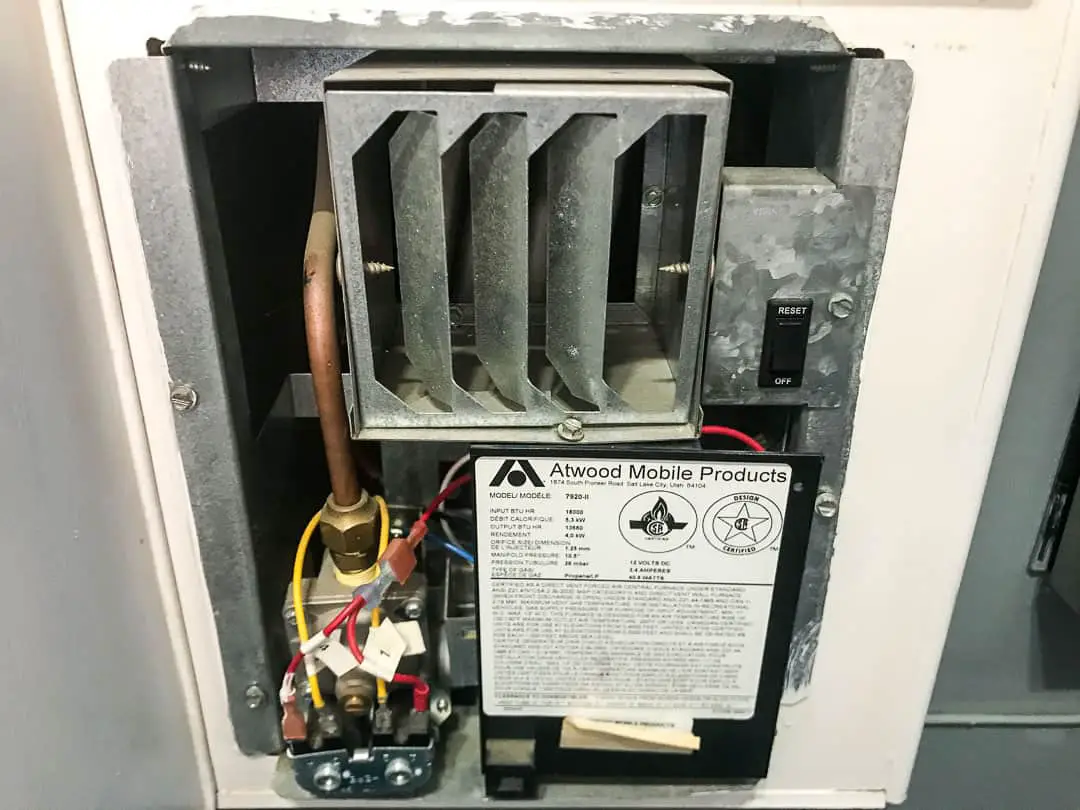
Heater
Most truck campers have forced air heaters. This means that a 12-volt connection starts a fan within the heater appliance that pushes, or “forces,” the air to blow.
Within a few seconds, propane is released and ignited within the heater and thus the forced air pushes the heat into the camper.
Honestly, these are some of the most intimidating appliances you can find in a truck camper! But the convenience of having propane-fueled heat during cold nights is fantastic. If you have forced-air heating you will also have a thermostat that will monitor when to signal the heater to ignite.
This was intimidating to us because our heater was the source of our propane leak I think we were more conscious of it having problems. But not once in three years have we had any issues once we fixed the propane leak.
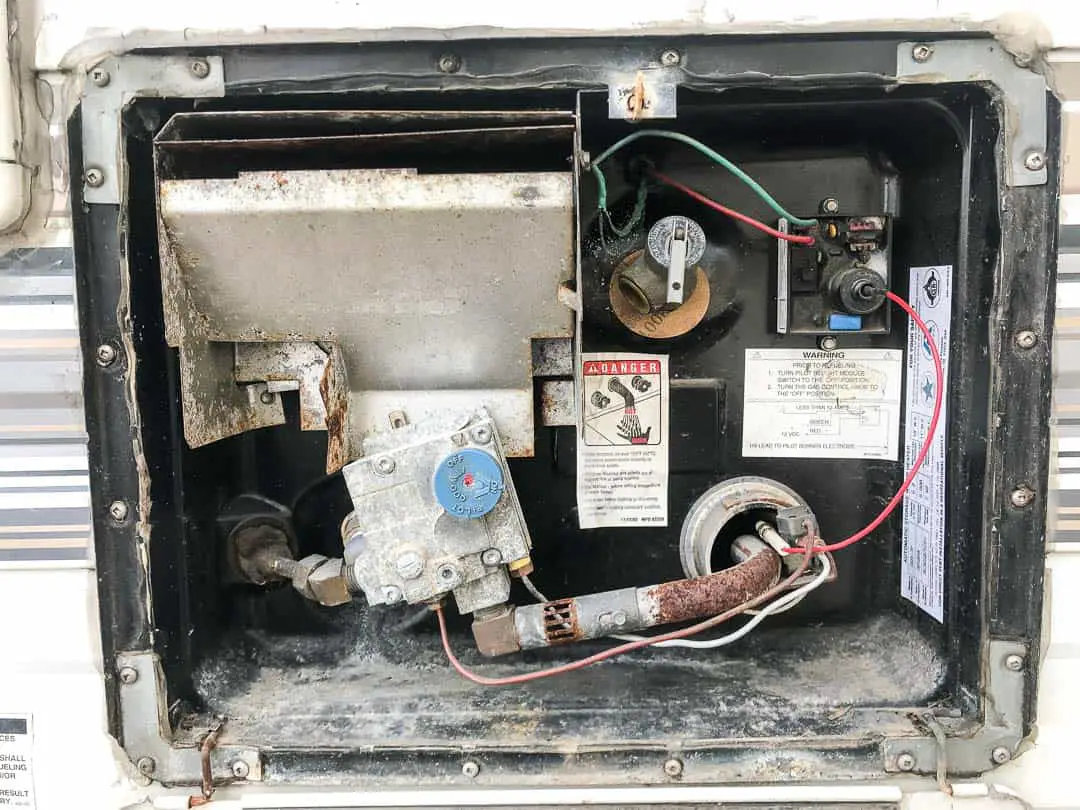
Hot Water Heater
The final propane appliance in your RV is the hot water heater (if applicable). Newer truck campers and RVs may come equipped with electric on-demand hot water heaters. But older and more common truck campers will have a propane hot water heater.
These appliances operate similarly to the other propane appliances. You will have some form of activating the heater to open the LP gas valve. And then there will be a pilot light that will ignite, followed by a full-on flame.
Our truck camper uses a “White Rogers” control to ignite the water heater. We have to manually turn on a button that creates a small electrical charge that arches between two pieces of metal, creating a spark where propane fuel is released.
When the spark ignites the propane the pilot light is lit. Shortly thereafter we turn the knob to open up the flow of propane and a larger flame ignites. At first, this was startling to us as it reminded us of the afterburners of the F-14 airplanes in Top Gun!
Another form of hot water heater is the electronic ignition. This is much simpler and all of the ignition is done remotely and automatically with the switch of a button.
Now that you know the basics of your propane appliances and the importance of putting safety first you should be able to better operate your propane appliances.
Always be sure to read the individual manuals for each appliance as yours may operate differently than described in this post.
But in general, if you test your alarms and read the manuals on how to operate each appliance you will find that truck camper life will be much more comfortable with all of these great propane appliances!
